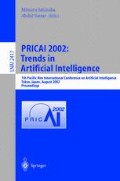Abstract
This paper investigates the coding of change-points in the information-theoretic Minimum Message Length (MML) framework. Change-point coding regions affect model selection and parameter estimation in problems such as time series segmentation and decision trees. The Minimum Message Length (MML) and Minimum Description Length (MDL78) approaches to change-point problems have been shown to perform well by several authors. In this paper we compare some published MML and MDL78 methods and introduce some new MML approximations called ‘MMLDc’ and ‘MMLDF’. These new approximations are empirically compared with Strict MML (SMML), Fairly Strict MML (FSMML), MML68, the Minimum Expected Kullback-Leibler Distance (MEKLD) loss function and MDL78 on a tractable binomial change-point problem.
Access this chapter
Tax calculation will be finalised at checkout
Purchases are for personal use only
Preview
Unable to display preview. Download preview PDF.
References
Wallace, C.S., Boulton, D.M.: An information measure for classification. Computer Journal 11 (1968) 185–194
Wallace, C.S., Freeman, P.R.: Estimation and inference by compact encoding (with discussion). Journal of the Royal Statistical Society. Series B (Methodological) 49 (1987) 240–265
Wallace, C.S., Dowe, D.L.: Minimum message length and Kolmogorov complexity. Computer Journal 42 (1999) 270–283
Baxter, R.A., Oliver, J.J.: The kindest cut: minimum message length segmentation. In Arikawa, S., Sharma, A.K., eds.: Proceedings of the Seventh International Workshop on Algorithmic Learning Theory. Volume 1160 of LNCS., Springer-Verlag Berlin (1996) 83–90
Oliver, J.J., Forbes, C.S.: Bayesian approaches to segmenting a simple time series. Technical Report 97/336, Department Computer Science, Monash University, Australia 3168 (1997)
Oliver, J.J., Baxter, R.A., Wallace, C.S.: Minimum message length segmentation. In Wu, X., Kotagiri, R., Korb, K., eds.: Research and Development in Knowledge Discovery and Data Mining (PAKDD-98), Springer (1998) 83–90
Viswanathan, M., Wallace, C.S., Dowe, D.L., Korb, K.: Finding cutpoints in noisy binary sequences-a revised empirical evaluation. In: Australian Joint Conference on Artificial Intelligence. (1999)
Fitzgibbon, L.J., Allison, L., Dowe, D.L.: Minimum message length grouping of ordered data. In Arimura, H., Jain, S., eds.: Proceedings of the Eleventh International Conference on Algorithmic Learning Theory (ALT2000). LNAI, Springer-Verlag Berlin (2000) 56–70
Farr, G.E., Wallace, C.S.: Algorithmic and combinatorial problems in strict minimum message length inference. In: Research on Combinatorial Algorithms. (1997) 50–58
Dowe, D.L., Baxter, R.A., Oliver, J.J., Wallace, C.S.: Point estimation using the Kullback-Leibler loss function and MML. In: Pacific-Asia Conference on Knowledge Discovery and Data Mining (PAKDD98). Volume LNAI of 1394., Springer-Verlag (1998) 87–95
Baxter, R.A.: Minimum Message Length Inductive Inference: Theory and Applications. PhD thesis, Department of Computer Science, Monash University (1996)
Wallace, C.S.: PAKDD-98 Tutorial: Data Mining. Monash University, Australia (Book in preparation) (1998)
Fisher, W.D.: On grouping for maximum homogeneity. Journal of the American Statistical Society 53 (1958) 789–798
Kearns, M., Mansour, Y., Ng, A.Y., Ron, D.: An experimental and theoretical comparison of model selection methods. Machine Learning 27 (1997) 7–50
Lam, E.: Improved approximations in MML. Honours thesis, Monash University, School of Computer Science and Software Engineering, Monash University, Clayton, Australia (2000)
Rissanen, J.J.: Modeling by shortest data description. Automatica 14 (1978) 465–471
Author information
Authors and Affiliations
Editor information
Editors and Affiliations
Rights and permissions
Copyright information
© 2002 Springer-Verlag Berlin Heidelberg
About this paper
Cite this paper
Fitzgibbon, L.J., Dowe, D.L., Allison, L. (2002). Change-Point Estimation Using New Minimum Message Length Approximations. In: Ishizuka, M., Sattar, A. (eds) PRICAI 2002: Trends in Artificial Intelligence. PRICAI 2002. Lecture Notes in Computer Science(), vol 2417. Springer, Berlin, Heidelberg. https://doi.org/10.1007/3-540-45683-X_28
Download citation
DOI: https://doi.org/10.1007/3-540-45683-X_28
Published:
Publisher Name: Springer, Berlin, Heidelberg
Print ISBN: 978-3-540-44038-3
Online ISBN: 978-3-540-45683-4
eBook Packages: Springer Book Archive

